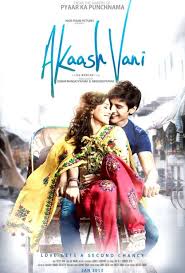Heartfelt and nuanced, this romantic drama stars Kartik Aaryan and Nushrat Bharucha as Akaash and Vani, two young college students who navigate love, friendship, and societal expectations. Set primarily in the vibrant cityscape of Delhi and the scenic hills of Himachal Pradesh, the film captures both urban and rural India, contrasting Vani’s conservative hometown with the liberal college environment that allows the central relationship to blossom. Directed by Luv Ranjan, the movie taps into the romance-drama genre but also tackles deeper themes of individual identity and societal pressures.
The story follows Akaash and Vani as they meet in college, quickly forming a bond that deepens into love. Their carefree days of friendship and love are soon disrupted by unavoidable circumstances, and Vani finds herself forced into a life she hadn’t planned. Caught between her love for Akaash and her family’s traditional expectations, she struggles to make choices that could forever alter her path. The narrative explores their journey, both together and individually, as they wrestle with the costs of choosing happiness over obligation and self-worth over social expectations.
In terms of acting, Kartik and Nushrat deliver strong performances that elevate the story’s emotional intensity. Nushrat’s portrayal of Vani is heartfelt and authentic, especially in scenes that depict her inner struggle and turmoil. She successfully embodies the pain and resilience of her character, and her nuanced performance adds depth to Vani, making her more than just a romantic lead. Kartik, too, brings Akaash’s character to life with an engaging energy and a mix of charm and sincerity. His chemistry with Nushrat feels natural and unforced, allowing their relationship to be believable and relatable. Their performances are the film’s core, as they navigate scenes of vulnerability, conflict, and love with authenticity, each delivering some of their career’s best work in the emotional high points.
One of the film’s standout elements is its direction and tone. Luv Ranjan approaches the story with sensitivity, especially when dealing with themes of self-sacrifice, societal pressure, and gender roles. He avoids the typical clichés of romance, focusing instead on the characters’ internal battles and the compromises they’re pressured into by family and society. The pacing, however, is slightly uneven in parts, with some sections feeling stretched. This does affect the momentum, but Ranjan’s strong storytelling instincts keep the viewer invested in Vani and Akaash’s journey, creating an emotional resonance that lingers.
The cinematography by Sudhir K. Chaudhary captures the film’s contrasting settings beautifully, transitioning from the hustle and color of Delhi to the serene but restrictive environment of Vani’s hometown. The camera work adds to the storytelling, with wide, airy shots during the college scenes that convey a sense of freedom and possibilities, while the close-ups in the second half focus on Vani’s isolation and her struggle. The visual storytelling complements the narrative, helping us feel the highs and lows of Akaash and Vani’s journey. Lighting choices and color tones are well-suited to the mood of each scene, enhancing the emotional impact without feeling forced.
The music, composed by Hitesh Sonik, plays a significant role in the film, with tracks that capture both the joyful and painful moments of the story. Songs like “Bas Main Aur Tu” underscore Akaash and Vani’s carefree days, while “Tera Nasha” is hauntingly powerful in conveying Vani’s emotional journey. The background score is subtle, enhancing moments without overshadowing them, allowing the dialogues and performances to remain in focus. The film’s music connects seamlessly with the narrative, reflecting the characters’ emotional states and making the movie feel complete in its storytelling approach.
Costume design and setting are integral to the film, as Vani’s changing attire reflects her journey from a free-spirited college girl to a woman weighed down by societal expectations. The costumes for both characters add to their personalities, with Akaash’s casual, modern style in sharp contrast to Vani’s transformation from colorful, youthful outfits to more subdued, traditional wear as her life changes. The contrast in their outfits reflects their states of mind and circumstances, and these visual cues subtly support the story’s larger themes. The college scenes are filled with vibrant, youthful energy, creating a stark difference when we see Vani’s life back at her hometown, highlighting her transition and loss of personal freedom.
One area where the film falls slightly short is in its length and pacing. Some scenes, especially in the second half, could have been trimmed for a tighter narrative. A few sections feel repetitive, particularly where the story delves into Vani’s turmoil, which could have been expressed more concisely. While the intention is clear—to showcase her entrapment and pain—these segments sometimes drag, slightly weakening the overall impact. Despite this, the film’s emotional strength and realistic portrayal of love and sacrifice manage to keep the audience engaged.
In its entirety, this is a love story with substance, veering into themes that are more serious and grounded than typical Bollywood romances. Kartik and Nushrat’s performances are sincere and compelling, making Akaash and Vani’s love story feel both relatable and poignant. It’s refreshing to see a film that dares to show the darker, more challenging aspects of love and relationships, especially in a culture that often glorifies compromise in the name of duty. For viewers seeking more than a conventional romance, this movie offers a journey of love and self-worth, exploring how societal expectations can strain relationships and an individual’s sense of self.
Ultimately, this is a movie worth watching for its strong performances, heartfelt storytelling, and thoughtful exploration of complex themes. While it may not appeal to viewers looking for light-hearted escapism, it will resonate with anyone who’s experienced the push and pull between personal desires and familial expectations. For those who appreciate a deeper look into the realities of relationships and the difficult choices that come with love, this film is a compelling watch. Its emotional resonance and unflinching honesty make it a standout, with Kartik and Nushrat proving that they’re capable of more than just youthful love stories.







